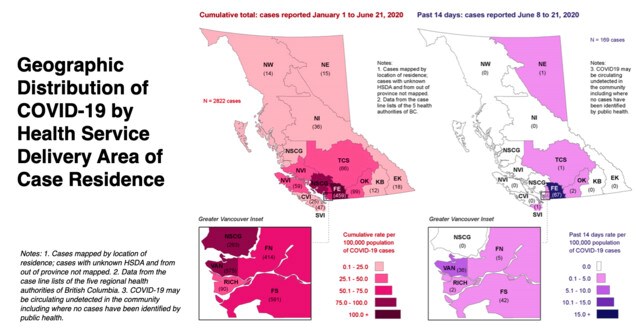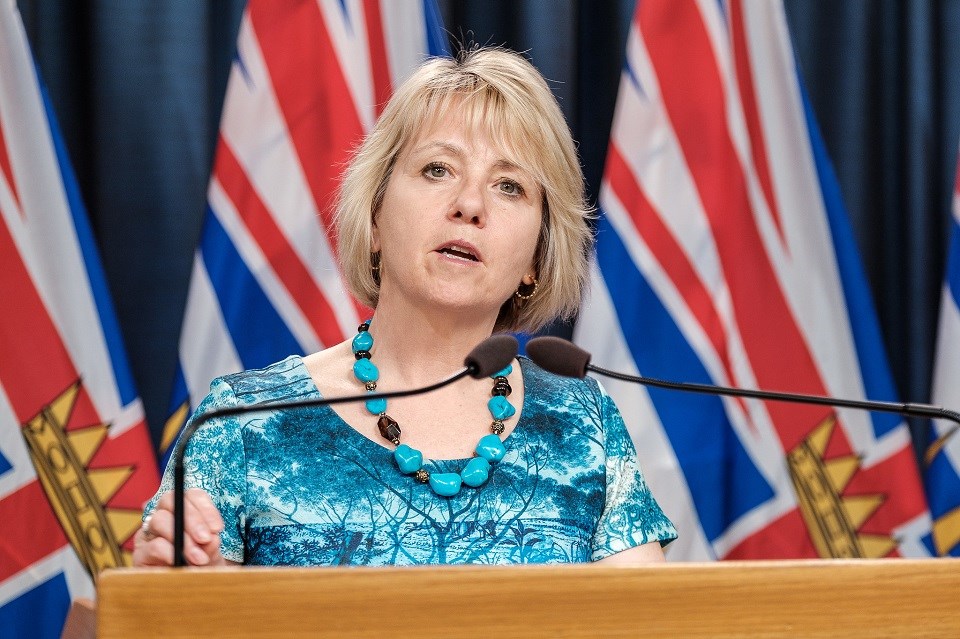June 9, 2020.
That's the last time Northern Health recorded a new positive case of COVID-19 as the regional authority officially goes two weeks without one.
Northern B.C. remains at 65 cases since the pandemic hit the province, according to Dr. Bonnie Henry.
The provincial health officer reported 13 new positive cases today (June 23) to bring B.C.'s grand total to 2,835.
Meanwhile, one person in long-term care passed away from the virus in the last 24 hours, rising the death toll to a new plateau at 170.
Close to 90 per cent of the total cases (2,491) have recovered and no longer require isolation, which includes all 65 in Northern Health, while 174 cases are still classified as 'active.'
Dr. Henry adds 16 people are still in hospital being treated for COVID-19.
Keeping this in mind, she says B.C. is approaching a threshold for renewed case growth as the economy reopens and residents increase their contacts with fellow residents.
Epidemiological modelling released today revealed contacts between British Columbians are at 65 per cent of normal rates.
The higher the percentage, the greater probability of COVID-19 spreading as people return to work, shop at stores, dine at restaurants or visit friends and family.
The west coast has seen a slight increase in contacts, but the data does not indicate a substantial increase in infections or hospitalizations.
Rather, this suggests that British Columbians have been increasing their contacts with others in a safe way, such as donning personal protective equipment, standing behind barriers and avoiding large gatherings in small spaces.
 B.C. epidemiological map of COVID-19 cases June 8-21, 2020 compared to the first five months of 2020. (via B.C. Centre for Disease Control)
B.C. epidemiological map of COVID-19 cases June 8-21, 2020 compared to the first five months of 2020. (via B.C. Centre for Disease Control)Health officials do not believe the province is bound for rapidly explosive growth based on current modelling.
Dr. Henry likened it to a slight increase of a dimmer switch on a light as opposed to a rapid spike.
The government is urging B.C. residents to abide by measures such as physical distancing, self-isolation for those who feel ill and practising proper hygiene.
The modelling also shows the province’s case rate per one million people is among the lowest in Canada, on par with Newfoundland and Labrador and dramatically less than provinces such as Ontario and Quebec.
At the same time, mobility data shows British Columbians are boosting their activity levels with more time spent in parks and less time inside their homes.
Provincial data shows mobility might be increasing for many in the province as people return to class and work but remain below seasonal norms in comparison with 2019 levels.
Meantime, the B.C. Centre for Disease Control (BCCDC) has been working with other jurisdictions to test wastewater for COVID-19, as the coronavirus has demonstrated the capacity to be shed in feces.
So far no samples of COVID-19 has been detected in any collected wastewater samples over the last five weeks, indicating a low level of community transmission.
But the research could be used as an early detection tool for communities.
Health Minister Adrian Dix noted that today's briefing was the 100th public presentation conducted by himself and Dr. Henry about COVID-19 cases and measures in B.C.
- with files from Tyler Orton, Business In Vancouver





